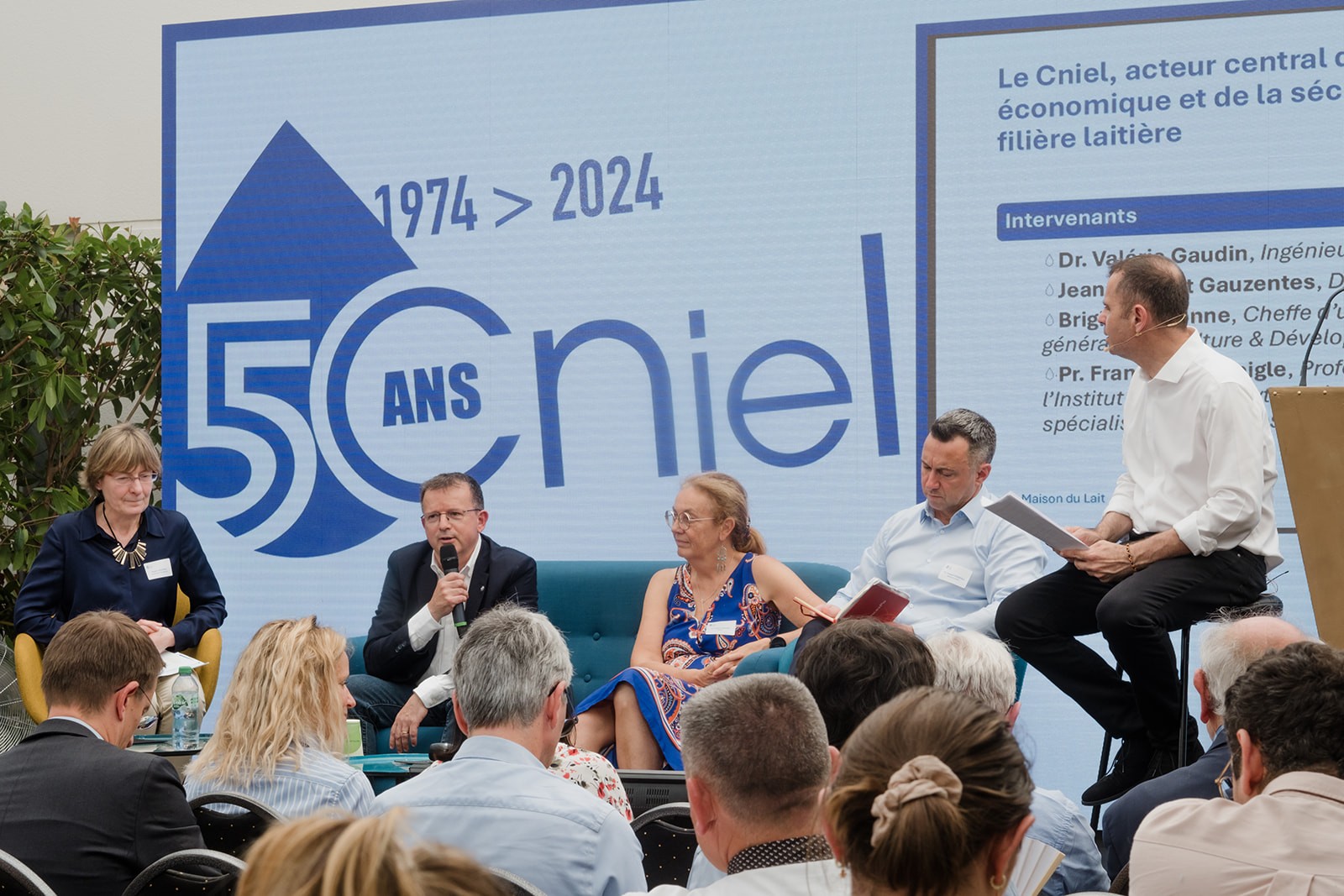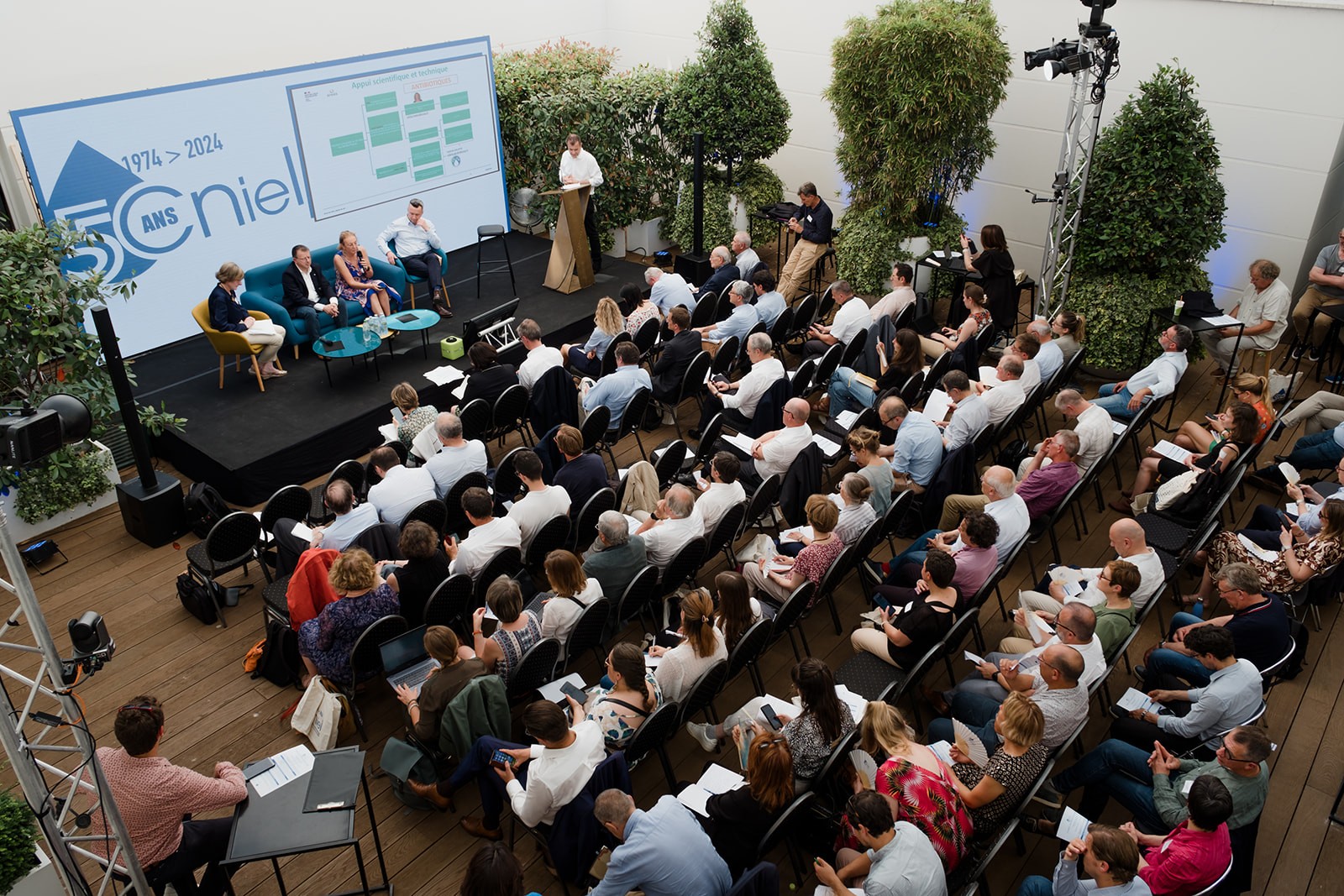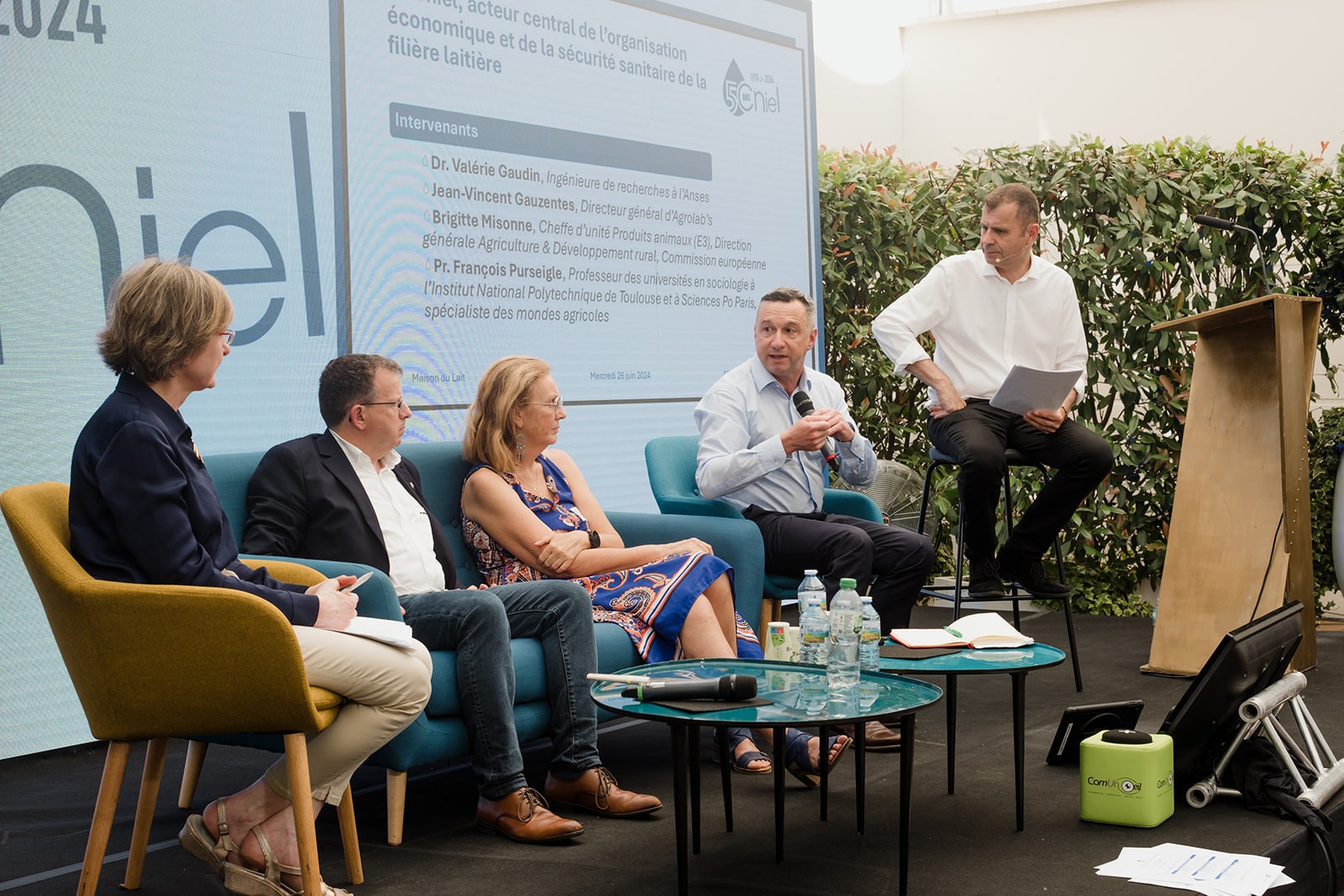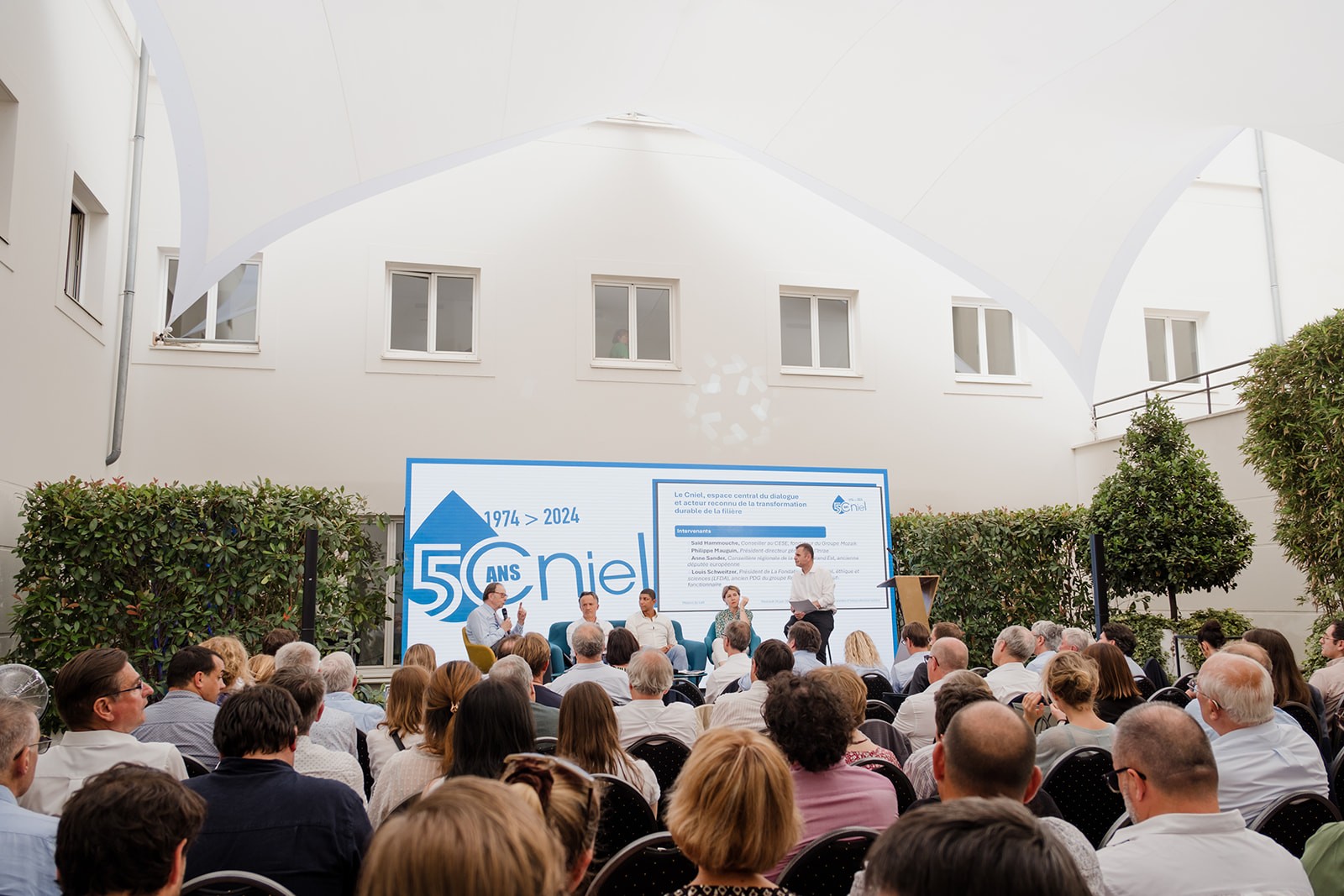
50 years of Cniel: A dairy sector undergoing transformation
The French Interprofessional Centre for the Dairy Economy (in French, the Centre National Interprofessionnel de l’Économie Laitière, more commonly referred to as the Cniel) is celebrating its 50th anniversary, marking half a century of evolution and adaptation in the French dairy sector. In the face of health, economic and environmental challenges, the organisation continues to play a pivotal role in the evolution and sustainability of the sector.From the Godefroy law to the present day: a constantly evolving mission
Created in 1974 , Cniel has established itself as a key player in the French dairy sector. Since the enactment of the Godefroy law of 1969, which introduced a milk payment scheme based upon composition and quality, the interprofessional organisation has constantly evolved to meet the new challenges of the sector.
« One of Cniel’s historic missions, recalls Jean-Vincent Gauzentes, Managing Director of the Agrolab’s laboratory network, c’est de garantir la qualité du lait à travers des critères précis was to guarantee milk quality by means of precise criteria – in simple terms, milk fat, protein and acidity. To accomplish this mission, the Cniel established a network of interprofessional laboratories responsible for analysing the milk supplied by farmers to processing plants. Today, this network includes 11 laboratories throughout France, ensuring complete coverage of the territory. They are essential to maintaining high quality standards and fair treatment for all stakeholders.”
By carrying out automatic samples, with an increasingly high frequency over time, laboratories play a crucial role in the management of health crises, underscores Jean-Vincent Gauzentes: « Interprofessional laboratories play a key role in monitoring herd profiles, enabling the eradication of certain diseases such as brucellosis and leukosis. If we hadn’t had this network of laboratories across the country, and the collection of samples with regular analyses, I’m not sure that we would have been able to move fast enough at the time. »
« One of Cniel’s historic missions, recalls Jean-Vincent Gauzentes, Managing Director of the Agrolab’s laboratory network, c’est de garantir la qualité du lait à travers des critères précis was to guarantee milk quality by means of precise criteria – in simple terms, milk fat, protein and acidity. To accomplish this mission, the Cniel established a network of interprofessional laboratories responsible for analysing the milk supplied by farmers to processing plants. Today, this network includes 11 laboratories throughout France, ensuring complete coverage of the territory. They are essential to maintaining high quality standards and fair treatment for all stakeholders.”
By carrying out automatic samples, with an increasingly high frequency over time, laboratories play a crucial role in the management of health crises, underscores Jean-Vincent Gauzentes: « Interprofessional laboratories play a key role in monitoring herd profiles, enabling the eradication of certain diseases such as brucellosis and leukosis. If we hadn’t had this network of laboratories across the country, and the collection of samples with regular analyses, I’m not sure that we would have been able to move fast enough at the time. »
 Guillaume Blanchon
Guillaume BlanchonInnovation and health safety
The safety of milk remains a priority, anchored in today’s practices via the reference tool Infolabo: « Infolabo centralises all the data coming back from the laboratories, and is accessible on mobile devices and almost in real timeexplains the director of Agrolab’s. Thanks to this tool, the Cniel and all the dairy sector stakeholders can react promptly to indications of a possible deterioration in milk quality. »
Innovation also extends to research, particularly through a number of partnerships. « Collaboration between Cniel and Anses is essential to meet current and future health challenges,insists Dr. Valérie Gaudin of Anses. « For example, in concrete terms, our cooperation has enabled us to develop advanced methods for detecting contaminants. We have also been working for many years on antibiotics and biocide disinfectants. These joint efforts have led to significant advances in the detection and management of health risks. »
Cniel therefore continues to innovate in response to sanitary challenges, drawing on solid partnerships and cutting-edge technologies. This proactive approach is essential to maintain consumer confidence and ensure high-quality dairy production.
Innovation also extends to research, particularly through a number of partnerships. « Collaboration between Cniel and Anses is essential to meet current and future health challenges,insists Dr. Valérie Gaudin of Anses. « For example, in concrete terms, our cooperation has enabled us to develop advanced methods for detecting contaminants. We have also been working for many years on antibiotics and biocide disinfectants. These joint efforts have led to significant advances in the detection and management of health risks. »
Cniel therefore continues to innovate in response to sanitary challenges, drawing on solid partnerships and cutting-edge technologies. This proactive approach is essential to maintain consumer confidence and ensure high-quality dairy production.
Facing socio-economic challenges
Over five decades, Cniel has responded to changing economic contexts. In particular, the interprofessional body played a crucial role during the end of the EU milk quotas in 2015, a major change in European agricultural policy that necessitated a complete reorganisation of the French dairy sector.
To cope with the transition, Cniel implemented several important actions. Firstly, the organisation encouraged and facilitated the establishment of contracts between producers and processors. As Brigitte Misonne, Head of the Animal Products Unit at the European Commission Directorate-General for Agriculture and Rural Development, explains: « The structuring of milk producers has been an essential response to managing the post-quota period.» Cniel also worked within the framework of the European Milk Package regulation, which brought innovations to structure the sector. Faced with the ban on direct price setting, Cniel developed price indicators, working with the European Commission to ensure their compliance with competition laws. A crucial aspect of Cniel’s action has been coordination at French national level, thereby avoiding the abandonment of dairy territories.
Cniel enabled the French dairy sector to navigate the challenges posed by the Covid-19 pandemic, ensuring economic stability and continuity of supply for dairy products. Among other things, in April 2020, at the start of the pandemic, Cniel used article 222 of the regulation on the Common organisation of agricultural markets in the EU to plan milk production. This measure enabled the interprofessional body to coordinate production to avoid surpluses and to stabilise the market. Producers who agreed to not increase their production received a bonus, which helped maintain the balance between supply and demand during this period of uncertainty.
Cniel also coordinated the stakeholders in the sector to ensure the continuity of supply despite the restrictions and worked to maintain milk processing plant operations within the sanitary constraints. At the same time, the Cniel maintained a strong public presence space as well as with European institutions to discuss price indicators and support measures, thereby strengthening confidence in the capacity of the sector to overcome the crisis.
Such economic and regulatory adaptation is part of the broader context of profound transformation in the social and demographic fabric of the dairy sector. « We’ve lost 200,000 farmers in 40 years, , » analyses sociologist François Purseigle. We therefore need to rethink our business models, imagining new forms of mutualisation and contractualisation… »
To cope with the transition, Cniel implemented several important actions. Firstly, the organisation encouraged and facilitated the establishment of contracts between producers and processors. As Brigitte Misonne, Head of the Animal Products Unit at the European Commission Directorate-General for Agriculture and Rural Development, explains: « The structuring of milk producers has been an essential response to managing the post-quota period.» Cniel also worked within the framework of the European Milk Package regulation, which brought innovations to structure the sector. Faced with the ban on direct price setting, Cniel developed price indicators, working with the European Commission to ensure their compliance with competition laws. A crucial aspect of Cniel’s action has been coordination at French national level, thereby avoiding the abandonment of dairy territories.
- The Covid 19 crisis
Cniel enabled the French dairy sector to navigate the challenges posed by the Covid-19 pandemic, ensuring economic stability and continuity of supply for dairy products. Among other things, in April 2020, at the start of the pandemic, Cniel used article 222 of the regulation on the Common organisation of agricultural markets in the EU to plan milk production. This measure enabled the interprofessional body to coordinate production to avoid surpluses and to stabilise the market. Producers who agreed to not increase their production received a bonus, which helped maintain the balance between supply and demand during this period of uncertainty.
Cniel also coordinated the stakeholders in the sector to ensure the continuity of supply despite the restrictions and worked to maintain milk processing plant operations within the sanitary constraints. At the same time, the Cniel maintained a strong public presence space as well as with European institutions to discuss price indicators and support measures, thereby strengthening confidence in the capacity of the sector to overcome the crisis.
Such economic and regulatory adaptation is part of the broader context of profound transformation in the social and demographic fabric of the dairy sector. « We’ve lost 200,000 farmers in 40 years, , » analyses sociologist François Purseigle. We therefore need to rethink our business models, imagining new forms of mutualisation and contractualisation… »
 Guillaume Blanchon
Guillaume BlanchonTowards sustainable dairy farming
For several years now, Cniel has been committed to the transition to sustainable agriculture. Brigitte Misonne emphasises: « The interprofessions can now set up collective actions that will enable the sector to move forward in terms of environmental sustainability, and climatic sustainability in particular. »
François Purseigle insists on farm modernisation: « It is essential to rearm farms in terms of resources and structures to meet today’s challenges. » . » He adds an important perspective on the future interprofessional role: « I think that interprofessions today, in 2024, are expected to be able to support the farm structures. We have a collective responsibility to think about structural change in this sector. » This vision underscores the importance of a collaborative, global approach to meet the future challenges of the dairy sector.
Over the past 50 years, Cniel has adapted to the profound changes in the French dairy sector. Today, the organisation faces new challenges: ensuring environmental sustainability, supporting technological innovation, and maintaining the sector’s competitiveness in an ever-changing European and global context.
Cniel has demonstrated its ability to innovate and adapt, particularly during major crises. Its strong presence in the public arena and its role in the economic structuring of the industry make it a key player for the future of the French dairy sector. Building on its experience and partnerships, Cniel continues to guide the French dairy sector towards a sustainable and prosperous future, while guaranteeing the quality and safety of French milk.
François Purseigle insists on farm modernisation: « It is essential to rearm farms in terms of resources and structures to meet today’s challenges. » . » He adds an important perspective on the future interprofessional role: « I think that interprofessions today, in 2024, are expected to be able to support the farm structures. We have a collective responsibility to think about structural change in this sector. » This vision underscores the importance of a collaborative, global approach to meet the future challenges of the dairy sector.
Over the past 50 years, Cniel has adapted to the profound changes in the French dairy sector. Today, the organisation faces new challenges: ensuring environmental sustainability, supporting technological innovation, and maintaining the sector’s competitiveness in an ever-changing European and global context.
Cniel has demonstrated its ability to innovate and adapt, particularly during major crises. Its strong presence in the public arena and its role in the economic structuring of the industry make it a key player for the future of the French dairy sector. Building on its experience and partnerships, Cniel continues to guide the French dairy sector towards a sustainable and prosperous future, while guaranteeing the quality and safety of French milk.
This article is based on a round table organised on the occasion of the Cniel General Assembly held at the Maison du Lait on 26 June, 2024. The round table was attended by:
- Jean-Vincent Gauzentes, General Director of the Agro-Lab’s laboratory network,
- Dr Valérie Gaudin, research engineer at Anses (the French Agency for Food, Environmental and Occupational Health & Safety),
- Brigitte Misonne, Head of the Animal Products Unit, Directorate-General for Agriculture and Rural Development, European Commission,
- François Purseigle, Professor of Sociology at the Institut National Polytechnique de Toulouse and Sciences Po Paris.
undefined 19/08/2024
undefined 09/09/2024



